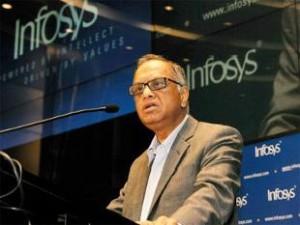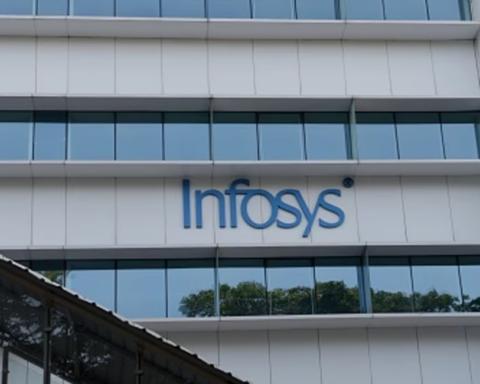 Chairman emeritus NR Narayana Murthy has returned to Infosys in an executive role with his 30-year-old son Rohan Murty in tow, a move that has surprised most observers, not all pleasantly. By becoming executive chairman once again, Murthy, 66, says he hopes to “add value to the mission” of chief executive S D Shibulal, who has become the lightning rod for criticism at the underperforming company. KV Kamath, the non-executive chairman, becomes the lead independent director from June 1.
Chairman emeritus NR Narayana Murthy has returned to Infosys in an executive role with his 30-year-old son Rohan Murty in tow, a move that has surprised most observers, not all pleasantly. By becoming executive chairman once again, Murthy, 66, says he hopes to “add value to the mission” of chief executive S D Shibulal, who has become the lightning rod for criticism at the underperforming company. KV Kamath, the non-executive chairman, becomes the lead independent director from June 1.
Executive co-chairman Kris Gopalakrishnan has been demoted to the role of vice-chairman and Rohan will be executive assistant to his father. “I did not in my wildest dreams imagine that I would be back here in an executive capacity,” Murthy said at a press conference. “The quickest and best way of my being effective is by utilising the competencies of a small team of people that I have been interacting with in the past 2-3 years and one of them happens to be Rohan,” he said justifying his son’s induction into Infosys.
Besides his son, others from Catamaran, his venture capital fund, are expected to be part of this team. Kamath justified the decision in terms of “context” and the board’s “duty of care” legal obligation. Murthy said the subject of his taking over as chairman was broached first to him by Kamath on May 4, following which he had discussions with Gopalakrishnan and Shibulal, who welcomed the idea.
The board passed a unanimous resolution appointing Murthy as chairman on Saturday. In a possible glimpse into his strategy, Murthy stressed the importance of winning more technology contracts that focus on application development as well remote infrastructure management, two areas that Infosys during the past two years have termed commoditised and low-margin.
These are also the areas where rivals have been overtaking Infosys and scoring on the growth front. Bangalore-based Infosys, founded in 1981, used to set the industry standard for growth and profits but it has been struggling to keep pace during the past two years. In 2012-13, when Infosys saw its sales expanding by 5.8% to $7.4 billion (`41,880 crore), the rest of the industry grew nearly twice as fast.
“His coming back alone is a strong message that he was not happy with the way things were going and that he wants to refurbish the organisation and steer it to its glorious days once again,” said TV Mohandas Pai, a former board member at Infosys who was also its finance and HR head. Pai left in 2011 amid rumours that he had ambitions to be the chief executive, a role so far monopolised by founders.
To be sure, the mood on campus after the announcement of Murthy’s appointment has perked up. One employee who did not want to be named said: “I see reason for optimism.. It’s the first good thing I have heard in recent years. It’s cause for hope.” Another felt he expected this announcement “to be followed by more positive news.
We could see a series of positive actions in the coming days, on the sales front and on the employee front.” A third person on campus who ET spoke to said: “At least now we have a decisive person.” The stock market reaction is mixed. Rashesh Shah, chairman & CEO, Edelweiss group, says Murthy’s return will augur well for the company and its investors given the tough operating environment.
“We expect buying in Infosys stock over next two-three days; we expect the experience of Murthy to reflect on results in the next three quarters,” adds Amar Ambani, head of research IIFL. Not everyone is as convinced. “It’s surprising. Investors are taking this as a confidence booster and many are comparing it with P&G’s recent decision to reappoint AG Lafley as chairman & CEO,” said Sandeep Muthangi, vice-president, research at Mumbai-based brokerage IIFL Institutional Equities.
Corporate governance experts see Murthy’s decision as going back on some of the principles that the company and he have espoused for more than three decades. “There are business pressures on Infosys, but I don’t see how bringing Murthy back is the answer,” said Shriram Subramanian of investor advisory InGovern. “It also throws out of the window some of the professed principles around retirement age and family members of founders.”
As if anticipating criticism, Murthy addressed it in his letter to the employees, where he said that his son’s “charter is to be my executive assistant and not to aspire to become the next CEO.” In the past, Murthy has repeatedly said that those over 65 years should only play advisory, not executive, roles, arguing in favour of young blood and fresh ideas. He has also inveighed against nepotism in corporate and public life.
K Ramachandran, who teaches entrepreneurship at the Indian School of Business, thinks Infosys should have taken a more significant leadership decision much earlier. “The founder coming back is not a great idea because it means the company did not have the right mix of leadership skills to run the company,” says the professor. “Also, the board has been watching the leadership get out of hand and the company lose its competitive ranking for some time. A prudent board should have stepped in before this.”
He adds that the assumption that the owners are the best people to run a company is not sound and has been proved wrong again and again across the world. It is ironical that, as Pari Natarajan, CEO, Zinnov Management Consulting puts it, that Infosys has to go into the past to overcome hurdles in the future. “The new set of leaders will be required to take bold, courageous and unpopular steps to put the company back on the growth path,” adds the head of the advisory firm. Infosys’ employees, customers and investors will be eagerly and anxiously awaiting the strategy NRN unveils in the coming months.







